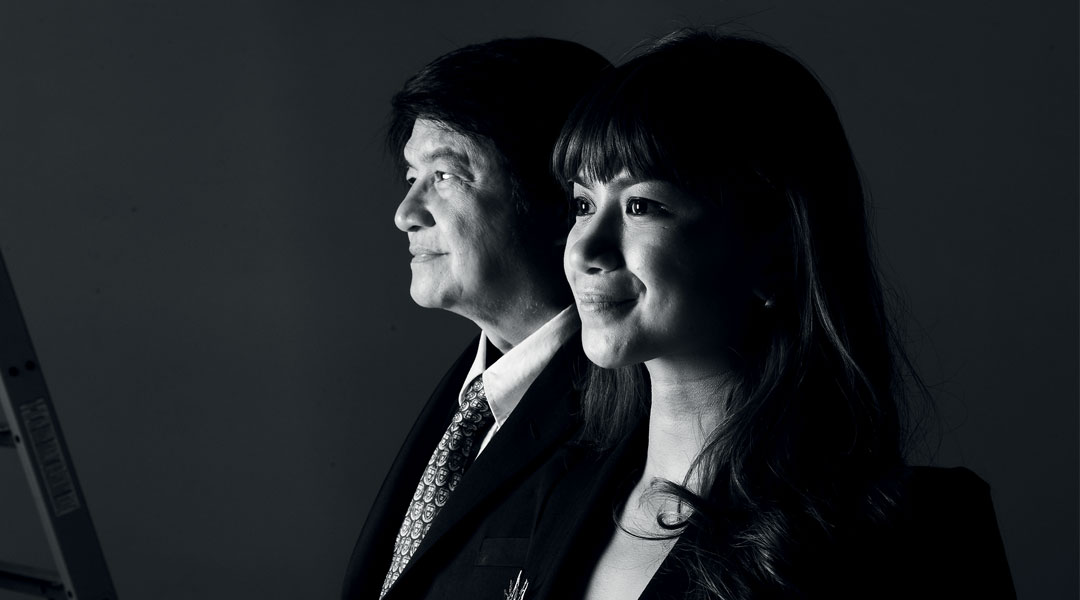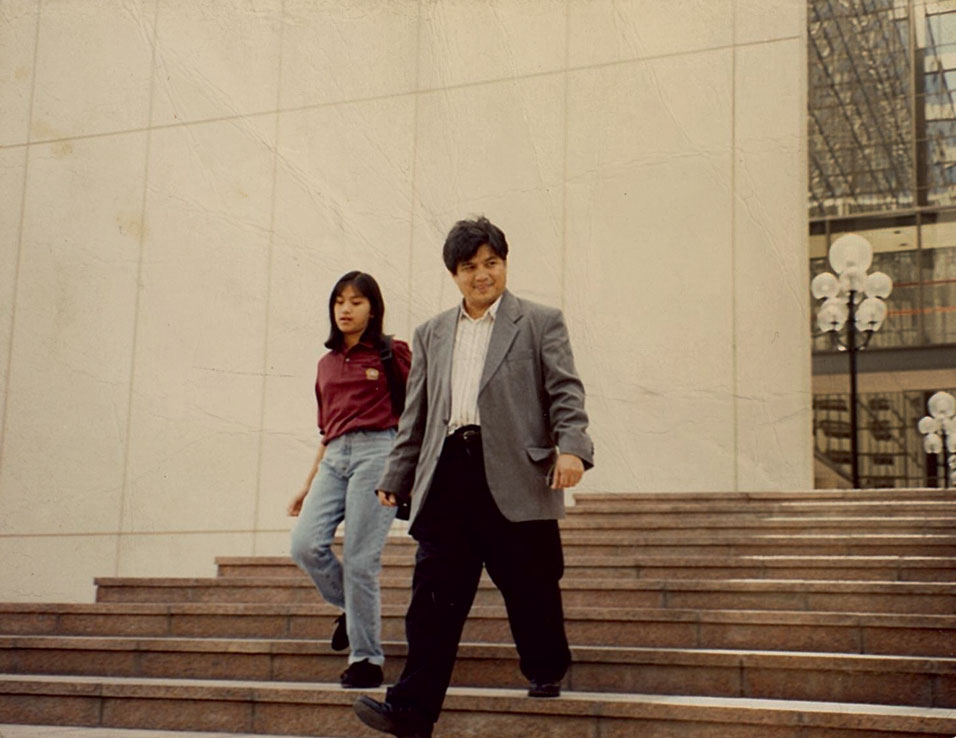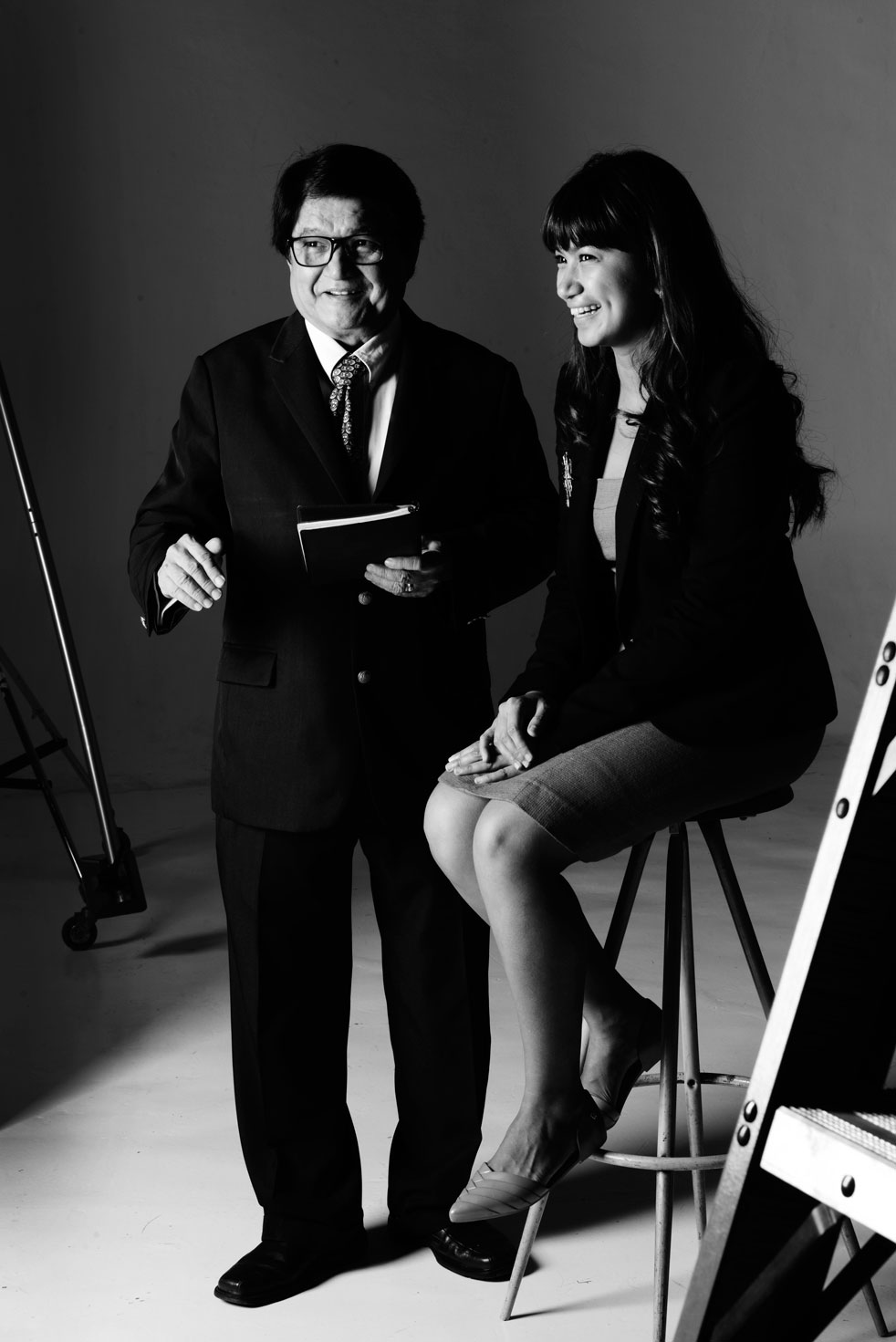
Succeeding Success: Jun and Karmi Palafox
They couldn’t be more different. Felino “Jun” Palafox, Jr., is a man of many words, quick to share his ideas and rattle off his firm’s achievements, while Karima “Karmi” Palafox is reserved, occasionally nodding to her father’s oratories during the interview and speaking only when posed a question. However vastly they may differ, both possess the same drive to power their company to international and global heights. The Palafox Associates’ father-daughter tandem proves that a successful partnership doesn’t necessarily work only because of similarities that partners share, but also because of the strengths that they complement each other with.

Tell us about your background, Karmi.
Karmi: I’m an urban planner. Growing up, my siblings and I know how hard my dad worked; we did not see him as much as our friends would see their dad. So we agreed that none of us would be architects because we wouldn’t get to spend as much time with [our family]. But around 2003, when I was doing my Master’s thesis about mixed use developments in the University of Asia & Pacific, that’s when I got interested, so I thought, why don’t I try urban planning. In 2000, we moved to Rockwell after living in the suburbs in Alabang. We lived on the 35th floor and had a good view of Metro Manila, of the skylines, and more importantly, the difference between the suburbs and the city. So I finished my Masters in Economics, became my dad’s researcher when he was studying in Harvard, and I met one of his professors there. I thought he would say that I should study in the US when I said I wanted to look at urban planning, urban design and focus on the environment, but he said go to the UK instead—
Jun: At the Oxford Brookes University School for the Built Environment.
Karmi: My interest also comes from traveling. My parents would always take us around. When I lived on my own in the UK, I would travel around Europe.
Jun: We usually traveled once a year as a family, so they would be exposed to the architecture and arts of the place. I tell them that for every year of their age, they should go to another country. I’m 64 years old, and I’ve been to 63 countries. Karmi is young, but she’s already seen more countries than her age.
Karmi: It’s like a contest within the family. Match your age. [Laughs]
Which city would you say has the best urban plan?
Karmi: Barcelona. It’s probably the most retrofitted city in the world. They really invested in purchasing properties to turn into open spaces, and ensuring that it is accessible for pedestrians. They respected and would update the Cèrda Plan—it’s a grid plan, and inside the grid is open space. The way it’s designed, there’s practically no setback, so you see the dialogue between the street, the person on the streetand the building. It’s nice, and it works.
Jun: I have a longer list of best planned cities in the world: Rome, London, Paris, and New York. I was in London last year for a big conference on tall buildings for blending together height and heritage. In our country, we don’t seem to have that. Also, these cities have open spaces, they have big central parks and so on. I spent a lot of time in the Boston Cambridge area, and they have a Boston necklace—all open areas connected by walkways. All the cities and countries that I’ve observed and worked in have five ingredients of success: visionary leadership, strong political will, good planning, good design and architecture, and good governance.
READ MORE: Succeeding Success: Bobby and Gelo Mañosa
Did you work for your father straightaway?
Karmi: Yeah, soon after. While studying, I worked at my university on studies on traffic and transport, I had a lot of interest in it as well. And of course, in relation to urban planning and urban design. Then I joined Palafox Associates in late 2005.

What were the challenges of joining the firm?
Karmi: One was going back to the Philippines, because I was in the UK for two years. Another was, my dad is practically a public figure, so there was that comparison which I thought was quite unfair because I had just finished school at the time. Challenges also included being integrated into the company, because when I joined, there were a lot of people quite older than me, and until now, there are seniors who report to me. Of course that was a challenge because some of them may think, what does she know, she’s a girl, she studied abroad… I just really wanted to do well without having to prove myself as my dad’s daughter. I made sure I would pass the board exam for urban planning, I had to study all the laws and all the standards here—
Jun: She was Top 10.
Karmi: Top 6. I was lucky I passed. [Laughs] After a while, I realized that in any work you do, there will always be critics, which is good because it keeps you on your toes.
Have you been tougher on your daughter than on other employees?
Jun: Yes, of course. I tell [our employees], to be a good leader, you must be a good follower. Another one is to be a good leader, you must be the exemplar, not the exempted. It applies to everyone, including me. Things like the dress code in the office—
Karmi: I come to work on time, and I file a leave even if I don’t have to.
Jun: Tardiness is lack of integrity. If you promise to be there and you’re not there, then…You dress up not for yourself, but for your clients, people you meet. And any time you should be ready to be called by your client. And since we’re global and international, simple things like dressing up and how to conduct yourself is very important. Karmi is better educated than me, she has more master’s degrees.
What do you admire most about each other?
Karmi: His patriotism. Maybe you’ve heard about these instances wherein, at the risk of our losing business, my dad would expose corruption. We’ve given up even private projects that didn’t follow our specifications because we feel that if they push through the way they intend to, it could impact the community negatively in terms of traffic and safety. So that’s one. Even our colleagues would tell you that’s one of the reasons why they joined the firm. Another is, he’s like a sponge for information. You tell him one statistic, he’ll always remember it. [Laughs] He’s also a good communicator, and I think that’s a big difference between the two of us. Me, I’d rather be quiet and work, and work in small groups, whereas my dad is the one who really likes sharing his ideas to the public.
Jun: For me, it’s that she’s trainable, for one. She’s a quick learner, and her being immediately global and international. She communicates very well also. There was a big speaking engagement that I couldn’t go to because I was out of the country, and she was accepted to take my place. And the organizer was surprised because she was able to deliver it better than I would have. [Laughs] She’s an urban planner, environmental planner and economist, so she straddles all of the other disciplines. We’re able to complement each other. And also she’s better at overseeing our contracts, our HR, our accounting and so on. And another one is, she’s more educated on Filipino and British urban planning. I’m more on the Filipino and American urban planning. So we complement each other there. Most of the time we agree, but there are times when we also agree to disagree. And we come up with better design solutions.

Does the professional life spill over into the personal?
Karmi: Well, I moved out of the house four years ago. [Laughs] I had to move out, because we were talking shop every single day…I felt sorry for my two siblings. My older sister is a doctor, and my younger brother, Philip, is working with us now, and is focused on possible new ventures for our business. He’s a lighting consultant, one of the very few in the Philippines. So it was too much, we were just talking about projects, and there were instances when we couldn’t really agree, whether it was a design or a particular project. It’s better now…when we see each other in the office, we don’t talk about personal stuff, and when we see each other at home or during weekends, we first say, “Can we talk shop?”
Jun: Sunday is family day. At least one family day a week is needed. And in those familydays, we’ll say, okay, let’s have just one hour for business talk.
Karmi: I’m also glad that my father allows me to argue with him, and even at his age he’s still open to learning, not just from me but from our associates as well.’
Jun: In this office, everybody is welcome to speak up.
Karmi: Although it’s hard to speak out when my dad is around, because he has a lot to share. [Laughs]
What would you have done if Karmi wasn’t around to succeed you?
Jun: We train all of our people in Palafox Associates to be capable of being a successor. We have a hierarchy of possible successors. It’s not a dynasty, that’s why we professionalized the firm with ISO standards. For example, if Karmi decides to live in Singapore, London, wherever, the company will still run, so we are prepared for that. That’s why we benchmark Palafox Associates against the best architectural and urban planning firms in the world. Two of my idols are Frank Lloyd Wright and Daniel Burnham. Where are they now? Maybe they did not have a succession plan. Last year, we even spent money on succession consultants.
Karmi: When I was still studying in the UK ten years ago, I didn’t even know I was going to work with my dad. But I was already reminding him about succession. It took eight years to convince him to do succession planning. [Laughs] I told him, I can’t be your only succession plan. As dad said, we hired some succession consultants, and the result of that undertaking is we were able to establish the Palafox Architecture Group. So there are five of us who are directors, and the five represent each of the generations. There is an architect director in his 20s, I’m in my 30s, our operations manager is in his 40s, a senior architect in his 50s and my dad in his 60s.
Jun: We tell the people here that we’re not just mutli-disciplinary, we’re also cross-generational. We have Baby Boomers, we have the X Generation, Y Generation and then the Millennials. So we are a lot of generations here. I also keep reminding them: almost 800 people have passed through our doors, and most of them are now abroad. There are 800 Filipino architects in Singapore, 60 of them trained in Palafox Associates. We also have people in Dubai, New York, Chicago, Hong Kong, Australia, and they still communicate with us and say that they’re so grateful that they worked here. It just shows that Filipinos can be global, can be international, one of the best in the world. And we’re proud of that. ![]()
This story first appeared as “Felino Jr. and Karima Palafox: Different Sides of the Same Coin” in BluPrint Special Issue 3, 2014. Minor edits have been made for Bluprint.ph.



